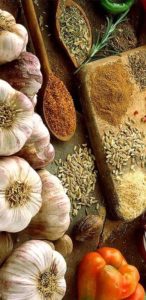From our list of herbs and spices, the following are recommended for Alzheimers Disease:
Scroll down for links.
- Bacopa Monnieri
- Blueberry
- Brazilian Guarana
- Catuaba
- Chinese Foxglove
- Curcumin
- Evening Primrose
- Ginkgo Biloba
- Gotu Kola
- Grapeseed
- Hawthorn Leaf
- Hemp Oil
- Irish Moss
- Lemon Balm
- Maca Root
- Muirapauma
- Omega-3 Fatty Acids
- Red Wine Extract
- Reishi Mushroom
- Rhodiola Root
- Rosemary
- Sage
- Schisandra Berry
- Siberian Ginseng
Natural Cures and Remedies for Alzheimers Disease
Alzheimers disease is a slow, progressive disease, starting with mild memory problems and ending with severe mental damage. How long a course the disease takes and how fast changes occur vary from person to person and may run from five to twenty or more years. To date, there is no treatment that can stop the disease. However, for some people in the early and middle stages of the disease, the drugs Tacrine, or THAT, or Cognex may alleviate some symptoms. Also, certain medicines may help to control behavioral symptoms of Alzheimers disease, such as sleeplessness, agitation, wandering, anxiety, and depression. Treating these symptoms often makes patients more comfortable and makes their care easier for care-givers. Supplemental 5-HTP has been used in Europe for some of these secondary symptoms with a degree of success.

4. Prescription and over-the-counter drugs can dull an elderly person’s personality and will to be active, and can cause lethargic mental processes, to again mimic Alzheimers disease. The average healthy elderly adult takes five pills per day. The average ill elderly adult takes 11 pills per day. Too many nursing homes feel that a tranquilized patient is a good patient and thus distribute drugs to dull their senses and their sense. All medications should be reviewed with a physician periodically and those that are not absolutely necessary should be stopped.
Bacopa Monnieri, Blueberry, Brazilian Guarana, Catuaba, Chinese Foxglove, Curcumin, Evening Primrose, Ginkgo Biloba, Gotu Kola, Grapeseed, Hawthorn Leaf, Hemp Oil, Irish Moss, Lemon Balm, Maca Root, Muirapauma, Omega-3 Fatty Acids, Red Wine Extract, Reishi Mushroom, Rhodiola Root, Rosemary, Sage, Schisandra Berry, Siberian Ginseng
The FDA has classified 5-HTP as an orphan drug. None of the pharmaceutical houses have a patent on 5-HTP, which probably lessens their incentive to spend much time and money researching the supplement. Since 5-HTP is not even in the PDR, quite frankly, many doctors are neither aware of, nor very conversant with, the product. On the other hand, some physicians are using 5-HTP for Parkinson’s disease, myoclonus, anxiety, depression, appetite control, Alzheimers disease, sleep disorders, autism, addictions, aggression, aging problems, dementia, and numerous other health problems. Most of this medical use of 5- HTP is considered experimental, and the number of authentic, placebo-controlled, double-blind studies of 5-HTP is limited, _ partly due to lack of funding and partly because, without patent protection, manufacturers hesitate to invest in research and development. In spite of this, it is classed as an investigational new drug (IND), so doctors who want to obtain 5-HTP and dispense it as part of a clinical investigation should get information from the Food and Drug Administration by contacting and applying for a TND# from the FDA Center for Drug Evaluation and Research, (301) 594-5460. The FDA may even supply 5-HTP free to a physician for experimental use.
The good news is that these problems and the hundred others that can mimic Alzheimers disease are all reversible if the causative deficiency is replaced. The diagnosis of Alzheimers should not be made until all other possible causes for the symptoms have been ruled out.
Also, certain medicines may help to control behavioral symptoms of A Alzheimers disease, such as sleepless ness, agitation, wandering, anxiety, and depression. Treating these symptoms often makes patients more comfortable and makes their care easier for care-givers. Supplemental 5-HTP has been used in Europe for some of these secondary symptoms with a degree of success.
Bacopa Monnieri
Blueberry
Brazilian Guarana
Catuaba
Chinese Foxglove
Curcumin
Evening Primrose
Ginkgo Biloba
Gotu Kola
Grapeseed
Hawthorn Leaf
Hemp Oil
Irish Moss
Lemon Balm
Maca Root
Muirapauma
Omega-3 Fatty Acids
Red Wine Extract
Reishi Mushroom
Rhodiola Root
Rosemary
Sage
Schisandra Berry
Siberian Ginseng
As the disease goes on, symptoms are more easily noticed and become acute enough to cause the individuals or their family members to seek medical help. People with the disease may forget how to do simple tasks, such as brushing their teeth, combing their hair, or expressing themselves. They can no longer think clearly and begin to have problems speaking, understanding, reading, or writing. Later on, they may become anxious or aggressive or wander away from home. Eventually, they may require total care. Doctors at specialized centers can correctly diagnose probable Alzheimers disease 80% to 90% of the time.
